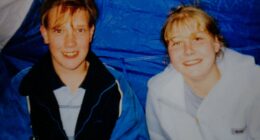For a young Westlake man, college football was everything. Just as he was getting ready for the season, life delivered a hit he never saw coming.
WESTLAKE, Ohio — Like a lot of kids growing up, Ben Lavelle tried his hand at many sports, but his foot, led the way.
“I’d always been like pretty good at kicking a ball from kickball recess and it kind of just came from that’s how that all started.”
Starting his journey at St. Edward High School, Ben had a successful football career, earning two state championships, being recognized as an All-Ohio first-team punter and placekicker, and catching the attention of Division I colleges. Ultimately, Ben decided to continue his academic and athletic pursuits at the University of Dayton.
Right from the start at the University of Dayton, Ben found a supportive community within his Flyer teammates, who became like family to him. However, during his freshman year, Ben faced a setback when he tore his hip labrum in September, leading to surgery in January and an extensive period of rehabilitation. By spring, he was finally given the go-ahead to resume training and enjoy some normal activities.


One memorable day, while playing Wiffle ball with his friends and celebrating a walk-off home run, Ben had a mishap that led to the discovery of a lump in his testicles. Recalling the incident, Ben shared, “I ended up getting hit ‘downstairs’ during the game, and the next morning, I felt something wasn’t right. That’s when I realized there was a problem.”
He already had a doctor’s appointment scheduled a few weeks later and made note to mention it. After the appointment, he was referred to a urologist. In his mind, fluid buildup from the Wiffle ball injury or recent hip surgery were to blame. The call from his urologist would change everything.


“He just told me that he had bad news and I was like, ‘OK, I don’t know what this could possibly be,'” Lavelle recalled. “And then the words ‘cancer’ came out. I sat there, I was like, ‘OK.'”
Testicular cancer, stage two, and at just 19 years old? Ben never saw it coming. Neither did his parents.
“He hands me the phone and he says, ‘Hey, Ben’s got cancer,'” Ben’s father Brian Lavelle remembered. “And I was like, ‘What do you mean he’s has cancer?'”
Julie Lavelle was stunned too.
“I was kind of in a state of shock,” she said. “It was not on our radar. It’s not anything anybody talked about, warned us about.”
But it is, in fact a young man’s disease.
“Testicular cancer in general is rare,” according to Dr. Adam Calaway, urologic oncologist at University Hospitals Seidman Cancer Center. “There’s about 10,000 cases diagnosed in the United States each year. It’s a rare cancer, but it’s the most common cancer for men 18 to 44.”
Ben became Calaway’s patient and felt a bond with the doctor, who not only put him at ease, but is a Flyer alum too.
Within five days after receiving his diagnosis, Lavelle underwent surgery at Seidman. Hopeful the surgery took care of the cancer, he still made it to football camp on time last August.
“I went all throughout camp getting blood work done and then found out at the very end of camp that my tumor marker numbers never went completely back down to zero,” he explained. “So they referred me to an oncologist and said that I need to go through chemo.”
Ben dressed for the Flyers’ first game of 2024, but left for home the next day. Kicking testicular cancer became his No. 1; tackling the stigma around it, a close second.
“I know who I was when I was 19 and 20 years old, and I’m in complete awe of what Ben is doing, because he is embracing this topic that is hard to talk about from a male standpoint and getting out there and putting it in the media and willing to be that spokesperson,” Brian Lavelle told us.
While undergoing nine weeks of chemo back in Cleveland, Ben refused to stay silent. He spoke with other young men about self exams and speaking up if something doesn’t seem right.
Ben’s “why” is a reminder written on is football cleats, just four letters shared with him years ago by a third-grade classmate who was battling cancer at the time.
“N-E-G-U: Never Ever Give Up,” Ben shared. “It clicks in my head that you can’t give up. You’ve got to have some fight left.”
His attitude and determination inspire not just his family, teammates, and friends, but his doctor too, who believes Ben will make a huge impact by sharing his story.
“He handled this with such a level of maturity that, putting myself in a 19 or 20-year-old college student’s shoes, I don’t think I would have handled it that way,” Calaway said. “It’s probably a testament to who he is as a person and how he was raised.”
Ben underwent one more surgery last December to remove lymph nodes in his stomach, where the cancer had spread. Today, he is cancer-free and back on campus, where he is now training again.
Ben went to class remotely throughout his chemotherapy, staying on track the whole time; one of his Dayton professors even traveled to an area library to administer a test for the sophomore. The Lavelle family is forever grateful for the UD support they’ve received.
Ben’s mom Julie says her son faced it all while maintaining a positive attitude.
“He wanted people to not worry about him,” she reflected. “He wanted them to see, ‘I’m smiling, I’m the same guy, and I want to get through this and I will get through it.’ And he has gotten through it.”
Ben Lavelle’s message to others? Don’t be afraid, don’t be embarrassed, Never Ever Give Up (NEGU).
“Now I’m getting a lot more comfortable talking about it and telling people ‘Hey if anything’s wrong, you’ve got to say something.”
April is Testicular Cancer Awareness Month. Calaway says it is highly curable, but as with all cancers, early detection can play a big role in treatment and outcomes.
Who is at risk for testicular cancer? Doctors see it in male patients typically between the ages of 18 and 44. Family history can play a factor, and it’s also more common in men who were born with an undescended testicle.
The Lavelle family has teamed up with GV Art + Design to create t-shirts, with funds going to the Testicular Cancer Society.


You can also sign up for an app that sends you monthly reminders about self exams. You can text “selfexam” to 888-986-7164. Your cellphone is only used for the reminder, and you can opt out at any time.
Learn more about how to do self exams HERE.

















